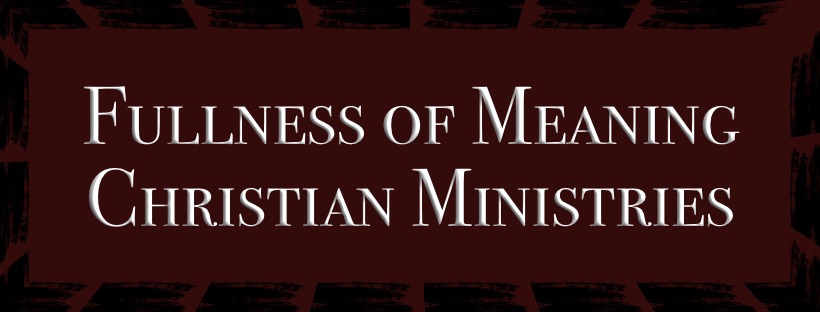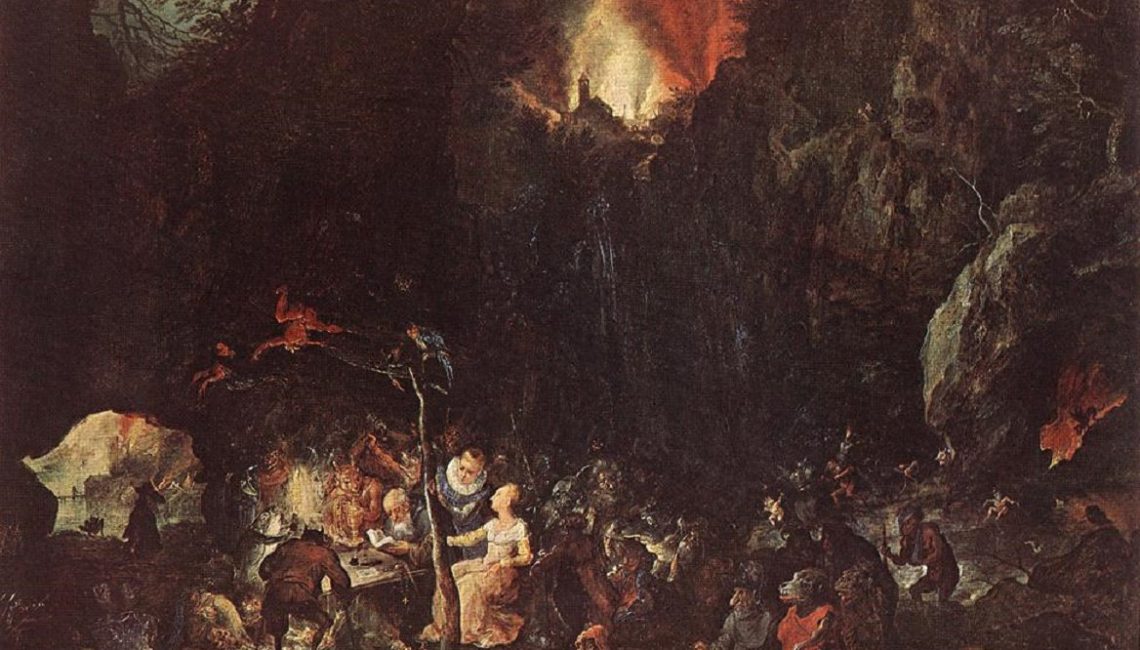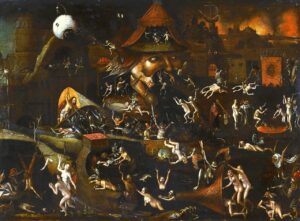Before I address Job chapter 3, I need to recap the seemingly quirky nature of Job 1 and 2 as a ‘necessary evil’. Both chapters were ‘set up’ to distill key elemental players into their proper places within the story or narration of Job.
These players or idolum (a term so brilliantly used in C.S. Lewis’ works when referring to a ‘higher mind; higher player” using the idolum {example: the objective chess pieces holding their potential degrees of usage for the Prime Mover’s expression upon the chessboard} to express IT’s *intention*) played their degrees by which ‘signs’ could be made. All such idules or Idolum lead to what I believe is the prime doctrine of meaning: Intentful-Loving Predeterminism.
I use the word, “evil”, in jest, for there is no independent agency of evil found in the book of Job under a Predeterministic God, Who Himself, set the parameters for which “The Satan” could only work his or destruction’s own representation of function, degree, machination, ethos, principle, boundary, jurisprudence, authority, ‘shem’.
As an American, I am so easily attracted to ‘the monster’, especially in the older horror films (i never needed the gore to ‘get the point’ ), that seemed to ‘rectify’ or ‘right-ify’ that which was unrighteous. Such was also the case for the Spaghetti Westerns when Clint Eastwood came in as the ‘a-moral’ player/ idolum (eidolum) as ‘the rectifier’ setting the corrupt town ablaze, leaving only the few “innocent” alive.
Interestingly, the idolum to which Clint Eastwood played, had no greater moral code than that which is understood by base animals. It was when the actions of the people fell below these basic civil principles (i.e., don’t murder, steal, covet, commit adultery, rape, lie, etc…) did lines get drawn by the tenor or unwavering actions of the ‘rectifier’.
In short, I used to love (guilty pleasure:I still do) seeing the “bad guys” get it by means of the avenging ‘angel/ monster/demon/–or whatever brought about ‘justice’. In this sophomoric view, I was about half-way there concerning the meaning of ‘rectification’ from it’s true sense.
The truer sense of the Idolum and Meaning of ‘the Story’ of Job
Hopefully, after reading this, I will have dispelled for you the Western Hemisphere’s notion of “Satan” or “The Satan” as a ‘being’ that holds a counter-force to God, man, nature, etc.
I would like to take you to the Medieval world which was a time that offered us a literary ‘catcher’s mitt’ of archaisms. This era, which cared for ‘the story’ of meaning, knitted stories such as King Arthur, Sir Gawain and the Green Knight, The Fairy Queen, Shakespeare’s MacBeth, Hamlet, etc., had compiled ancient stories with timeless and most precious archaisms that still give us cultural identity. This era of Medievalism gave us insight into philological treasures that cannot be dethatched in meaning and do safeguard our English language from the aeons of idiocy.
The Medieval view of “Evil” was distilled by it’s etymology and contextual meaning found in all of the classics as something that ‘did not fit’. “Evil” meant that which was ‘hated’, that which was a ‘societal discomfiture’, ’ugly’, ’disfigured’, ‘failed as beautiful by the standards of a Medieval “Cosmos” ( cf. Marsilio Ficino’s revival of the Platonic classical schools of thought for the ‘standard’, canon or rule of “that which was beautiful” and that which was not beautiful or cosmos-sound -i.e., ‘not-cosmetically sound’), ‘incapable of societal functions’, ‘mentally deficient’, ‘handicapped’, ‘hunch-backed’ ‘babbler’, idiot {Greek: eido (to see) -tace (to place): to see only what one wants to see or can see}, ‘isolated’, ‘stutterer (usually due to the ‘stuttering sound’ of an uncouth heathen-foreigner to the ears of the more civilized culture, etc.
Evidenced, or objectified within Beowulf, Anglo Saxon literature, we have the “Demon”, who was of ‘the bloodline of Cain’ for whom was identified as a Moor dweller. That both, the Grendel and his witch mother, were definitively, “monsters”, and “ogres” that stayed, usually, to their heathen-outcast regions until provoked. They were ‘misfit’ beings.
I address at this point the difference between Christian/ Jewish literature and Heathen literature. It is within the Heathen or Pagan literature that a ‘will to choose’ to cross the boundary line gets a little hazy.
Is it ‘self agency’ which makes ‘the story’ meaningful to the ancients and moderns? Or, was it the Predeterminative God that motivated the entire story – only to be found in the end of “the story” of the ancients? That is, the idolum which were made to be ‘whittled away’…as ‘literary mechanisms’…to get to the Final Meaning/ the Ultimate Truth?… I’ll take the second one.
Let’s take one last Medieval look at it’s literary mechanisms before going back to look at the synchronic and diachronic view of Job.
The idolum assumed as “the Satan” or “monster” from its philological sense goes as follows: Latin: Monere: “to remind, bring to one’s recollection, tell of, / admonish, advise, warn, INSTRUCT, TEACH; (from the earliest source >): Proto Indo European: moneie; “to make think of, remind” – {causative form of *men – {as in mensae} ) “to think”.
Looking at the “monster”, Grendel, he was considered in the Anglo Saxon as “AGLAEC” which meant, “CALAMITY”!!! –also meaning: “terror, distress, oppression” – which were ALL the key components in Job 1 and 2, both from the “MONSTER” (as truly defined here and the “Calamity” by which the MONSTER is known to bring.
The Sutra for “the MONSTER, the SATAN, Job, the CALAMITY” is found in Job’s words, “God brings good (Hebrew: “TOV”- ‘that which is beneficial’ ) and “CALAMITY (Hebrew: “Ra’ah”: ‘terror, distress, oppression, destruction’).
It is in the genius of the Narration of Job that we find his Theology vs. his wife’s.
His wife says, “curse God and die” while Job rebuts and says, “Will not God bring both TOV and RA’AH?!”
The “evidence (e -out/ vide-to see)” of the Idolum or objective character by which the morphing of meaning upon the objects of “the Story” is seen through Job’s story. Job’s narration or Story does offer us an aqueous solution by which we can witness transformation due to the prime mover and irregardless to the individuals in the story, including “the Satan”. Some idolum dissolved to infinite regress such as “The Satan” –for the “Story’s” sake of meaning, some idolum conform to the ‘identity’ more akin to the prime mover –such as Job being a “Christ typology”— a Perfect man, Pure, without blemish/ not deserving a retributive action upon him.
It is within this genius of non-retributive action upon Job that I see the error of his friends distilled out. Their error was from their world views tethered to pagan views concerning God’s relationship to mankind and the Devil. Namely, these pagan notions were/ are: dualism (God vs. Satan), Free Will (‘if only you hadn’t done this”), and retributive action (‘because you did this, Job, God is punishing you’).
All 3 errors are sadly found in most western Churches. All 3 errors are held as Theological constituents to a belief rather than a doctrine taught in the Narration Job.
It is here that I come to the conclusion that the ‘theology’ of Job was one of Sovereignty and he both acted and spoke to it in the first chapter. Job’s wife, on the other hand, spoke of a “god of allotments” in her denotative ideology–’curse God and die” — due to your “plight” or “allotments” of *loss* or *calamity*.
God does bring GOOD and CALAMITY for HIS good pleasure and for OUR BENEFIT. Isaiah 45:7 {“I the Lord Create both GOOD and DESTRUCTION for my Good Pleasure).





